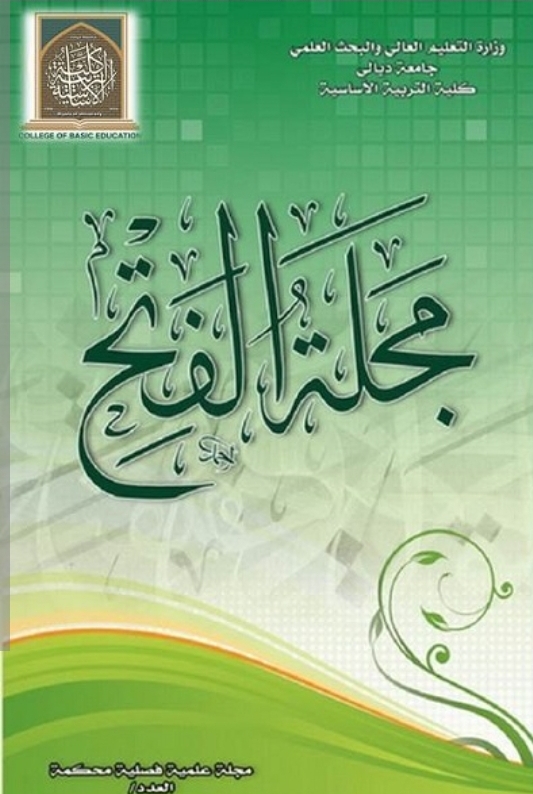Emotional Intelligence and its Relationship to Academic Adjustment of a Sample of Female Students Saudi and Non-Saudi High School Students
DOI:
https://doi.org/10.23813/FA/26/1/7Keywords:
Emotional Intelligence - Academic Adjustment - High schoolAbstract
The Present Study aimed to reveal the Relationship between Emotional Intelligence and Academic Adjustment among Saudi Students and Non-Saudi Students at the Secondary level. The Study followed the Correlational descriptive approach, and the study applied to a Sample of (200). A Student from the 60th High School for Girls and (47) Secondary School for Girls in Riyadh. The study used two measures of Emotional Intelligence and Academic Adjustment (Researcher’s preparation). The Results of the study reached a positive correlation between Emotional Intelligence and Academic Adjustment among the Students of the Study sample, and it was also found that there are no statistically significant differences among Saudi and Non-Saudi students on the IQ Scale. While there are statistically significant differences among Female Students on the Academic Adjustment Scale in favor of Non-Saudi Female Students, as well as the possibility of predicting Academic Adjustment through Emotional Intelligence.
References
المراجع العربية:
خطارة، رشيد (2011). الذكاء الوجداني وعلاقته بالتوافق الدراسي لدى تلاميذ السنة الأولى ثانوي، رسالة ماجستير منشورة، كلية العلوم الاجتماعية والإنسانية، جامعة قاصدي مرباح- ورقلة- الجزائر.
العلي، ماجد مصطفي (2017). الذكاء الوجداني وعلاقته بالتوافق الدراسي والإنجاز الأكاديمي لدى طلبة المرحلة الثانوية بدولة الكويت، مجلة العلوم الإجتماعية، 45(4)، 11-48.
غالي، كوثر (2018). مهارات الذكاء الوجداني وعلاقتها بالتوافق الدراسي لدى تلاميذ الطور النهائي " دراسة ميدانية ببعض ثانويات مدينة الوادي"، رسالة دكتوراه منشورة، كلية العلوم الإنسانية والاجتماعية، جامعة محمد خيضر بسكرة.
المراجع الأجنبية: References
Adeyemo, D. (2005). The Buffering Effect of Emotional Intelligence on the Adjustment of Secondary School Students in Transition. Electronic Journal of Research in Educational Psychology, 3 (2), 79-90.
Bar-On, R. (2000). Emotional and social intelligence: Insights from the Emotional Quotient Inventory (EQ-i). In R. Bar-On & J.D.A. Parker (Eds.), Handbook of Emotional Intelligence (pp. 363-388). San Francisco: Jossey-Bass.
Chang, H. H., & Lin H. F. (2011). The Study of the school adjustment and the school support system for the autistic elementary school students of regular classes in central Taiwan area, Journal of Bulletin of Special Education and Rehabilitation, 25, 25-46.
Echániz, l. (2015). Predictive ability of self-concept and emotional intelligence in perceived school adjustment, Journal of SOCIEDAD ESPAÑOLA DE PEDAGOGÍA, 67(4), 9-25.
Epstein, R. (1999). Constructive thinking: the key to emotional intelligence, Journal of Intelligence, 32(4), 20-30.
Gangadharamurthy,K .(2017). A Study of Emotional Intelligence and School Adjustment of IX Standard Students of Bangalore, Zentth International Journal of Multidisciplinary Research, 7(12), 201-207.
Goleman, D. (1995). Emotional intelligence: why it can matter more than IQ. NY: Bantam Books.
Goleman, D., Boyatzis, R., & McKee, A. (2002). Primal leadership: Learning to lead with emotional intelligence. Boston: Harvard Business School's Press.
Lasartem O., Goni, E., Camino, I., & Zubeldia,M .(2019). School Adjustment and Academic Self-concept in Secondary Education, Journal of RIE, 37(1), 163-179.
Lin, Y., Angela, S., Song, Y. (2012). Does your intelligence help to survive in a foreign jungle? The effects of cultural intelligence and emotional intelligence on cross-cultural adjustment, Journal of Intercultural Relations, 36 (4), 541-552
Lokhande, M., & Reichle, B. (2019).Acculturation and school adjustment of children and youth from culturally diverse backgrounds: Predictors and interventions for school Psychology, Journal of School Psychology, 75, 1-7.
Mayer, J.D., Caruso, D.R., & Salovey, P. (1997). Adults are better at emotional intelligence than adolescents. Emotional Intelligence Meets Traditional Standards for an Intelligence, Journal of Intelligence, 27,267-298.
Mikolajczak, M. & Luminet, O. (2008). Trait emotional intelligence and the cognitive appraisal of stressful events: An exploratory study, Journal of Personality Individual Differences, 44, 1445-1453.
Mittelmeier, J., Rienties, B., Rogaten,J., Gunter, A., & Raghuram, p.(2019). Internationalisation at a Distance and at Home: Academic and social adjustment in a South African distance learning context, International Journal of Intercultural Relations 72, 1–12.
Nasir, M. (2012). Emotional intelligence as a mediator in the relationship of cultural adjustment and academicachievement of international students. Journal of Academic Research International, 3(3): 275-280.
Nikooyeh, E., Zarani, F., & Fathabadi, J.(2017). The mediating role of social skills and sensation seeking in the relationship between trait emotional intelligence and school adjustment in adolescents, Journal of Adolescence, 59, 45-50.
Palak, K., Kusum, J., & Payal, K (2017). School Adjustment. Motivation and Academic Achievement Among Students, International Journal of Research in Social Sciences, 7(10), 333-348.
Stanley,L., Leonora,M., Edwards, R.,& Marquart,B.(2007). School Adjustment in Rural and Urban Communities: Do Students from "Timbukta" Differ from Their” City Slicker” Peers? Journal of Youth and Adolescence, 37, 22 5-238.
Wolf,S.,(2005). Emotional Competence Inventory (ECI). Technical manual.Hay group McClelland center for research and innovation. Hay Acquisition Company I, Inc.
Zhou,Y., Topping, K., & Todman, J.(2008). Theoretical model of culture shock an d adaptation in international students in higher education, Journal of Students in Higher Education, 33(1), 63-75.
Zorbaz, S., & Ergene, T. (2019). School adjustment of first-grade primary school students: Effects of family involvement, extern- alizing behavior, teacher and peer relations primary school students, Journal of Children and Youth Services Review, 101,307-316.
Downloads
Published
How to Cite
Issue
Section
License
Copyright (c) 2022 https://creativecommons.org/licenses/by/4.0/

This work is licensed under a Creative Commons Attribution 4.0 International License.
حقوق النشر والترخيص
تطبق مجلة الفتح للبحوث التربوية والنفسية ترخيص CC BY (ترخيص Creative Commons Attribution 4.0 International). يسمح هذا الترخيص للمؤلفين بالاحتفاظ بملكية حقوق الطبع والنشر لأوراقهم. لكن هذا الترخيص يسمح لأي مستخدم بتنزيل المقالة وطباعتها واستخراجها وإعادة استخدامها وأرشفتها وتوزيعها ، طالما تم منح الائتمان المناسب للمؤلفين ومصدر العمل. يضمن الترخيص أن المقالة ستكون متاحة على نطاق واسع بقدر الإمكان وأن المقالة يمكن تضمينها في أي أرشيف علمي.
لمزيد من المعلومات، يرجى متابعة الرابط: https://creativecommons.org/licenses/by/4.0/.



